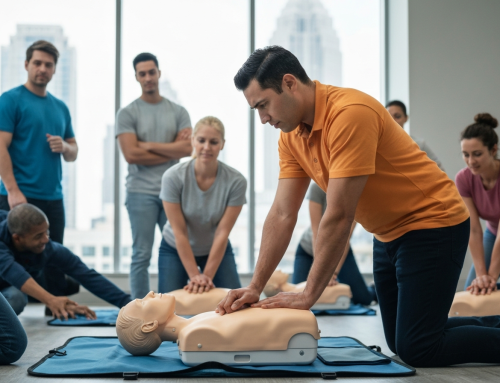Emergency Department Physicians’ Use of ACLS: An Essential Lifesaving Ability
For doctors working in emergency departments (EDs), Advanced Cardiovascular Life Support (ACLS) certification is essential as it provides them with the necessary knowledge and abilities to handle complicated cardiovascular situations. Acute coronary syndrome (ACS), stroke, and cardiac arrest are among the life-threatening illnesses for which Advanced Cardiovascular Life Support (ACLS) offers a standardized strategy in the hectic, high-stress setting of the emergency department. In addition to certification, ACLS training is essential for ED doctors to provide quality patient care and achieve desired results.
Advanced Cardiovascular Life Support (ACLS) is a course for healthcare professionals who respond to heart attacks. Adding to the knowledge of basic life support (BLS), ACLS emphasizes on:Identification and treatment of bradycardia, tachycardia, and respiratory and cardiac arrest.
Communication and team dynamics are crucial for efficiently organizing resuscitation efforts in a high-stress setting.Utilizing supraglottic airway devices and endotracheal intubation are examples of advanced airway management techniques.Pharmacology is the study of drugs that are used to treat illnesses and arrhythmias that can be fatal, such as amiodarone and epinephrine.Care following a cardiac arrest with an emphasis on improving patient outcomes following the restoration of spontaneous circulation (ROSC).
Emergency rooms are frequently the front lines of treatment, seeing patients in life-threatening situations that call for prompt and forceful action. ED doctors with ACLS certification are guaranteed to be capable of:Recognize Early Warning indications: ED doctors who have received ACLS training are better equipped to identify the warning indications of cardiac arrest or severe arrhythmias, which enables prompt intervention and higher survival rates. Acute myocardial infarction (MI) and stroke are two conditions that can worsen quickly. ACLS procedures help doctors know how to respond appropriately in these situations.Lead Code Teams: In cases of cardiac arrest, an ED doctor is often in charge of the resuscitation team. To ensure the highest possibility of saving a life in chaotic situations, ACLS training emphasizes the significance of efficient communication, role assignment, and adherence to established protocols.
Give Critical Medication: During cardiovascular emergencies, medications such as antiarrhythmics, atropine, and adrenaline are often administered. The appropriate timing and administration of these drugs are included in ACLS training, which lowers risks and raises the possibility of ROSC.
Maximize Post-Arrest Care: After a successful resuscitation, patient management is equally important as the initial emergency treatment. To enhance neurological outcomes, ACLS emphasizes the significance of post-cardiac arrest care, with an emphasis on breathing, oxygenation, and therapeutic hypothermia.
Because the recommendations are updated frequently to reflect the most recent findings in resuscitation science and cardiac care research, ED physicians must maintain their ACLS certification. Physicians are kept ready for the unexpected through regular refresher training and simulation-based practice, guaranteeing they can react to emergencies with confidence and accuracy.By being proficient in ACLS techniques, ED doctors may enhance patient outcomes, save lives, and deliver the best treatment possible when dealing with cardiovascular crises.
If you found our article Emergency Department Physicians’ Use of ACLS: An Essential Lifesaving Ability to be informative, perhaps you’ll also be interested in learning how to save a life by signing up for one of our classes [Here]
- Charlotte
- Rock Hill
- Gastonia
- Concord
- Cornelius
- Monroe
- Harrisburg
- Matthews
- Mint Hill
- Fort Mill
- Indian Land
- Kannapolis
- Belmont
- Wilmington
- Jacksonville
- Shallotte
- Carolina Beach
- Surf City
- Hampstead
- Sneads Ferry
- Leland
- Southport
- Greensboro
- High Point
- Hickory
- Columbia
- Florence
- Myrtle Beach
- North Myrtle Beach
- Surfside Beach
- Myrrells Inlet
- Conway
- Ocean Isle Beach






Leave A Comment